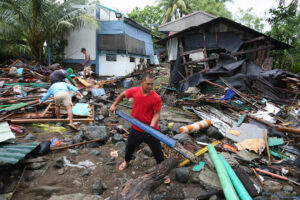At least 259 deaths were reported following the onslaught of two tropical cyclones, Fung-wong and Kalmaegi (local names: Uwan and Tino), which battered large parts of the country in recent weeks, according to the Office of Civil Defense (OCD).
The more recent Super Typhoon Fung-wong, which lashed Luzon last weekend, was reported to have claimed 27 lives as of Wednesday morning, Diego A. Mariano, deputy spokesperson of the OCD, told reporters via Viber message.
Most fatalities were recorded in Ifugao with nine deaths, followed by Benguet with four.
Mountain Province, Kalinga, and Nueva Vizcaya each reported three fatalities.
There was also one death each in Catanduanes, Capiz, Samar, and Sulu, as well as another in an unknown province.
Fung-wong also left two individuals missing, while 36 others were injured, the OCD said.
Meanwhile, the death toll from Typhoon Kalmaegi has climbed to 232, while the number of missing and injured individuals stands at 112 and 523, respectively.
Mr. Mariano said the majority of fatalities were concentrated in Cebu, with 150 deaths, followed by Negros Occidental with 42, Negros Oriental with 21, Agusan del Sur with 6, and Capiz with 3.
There were also two deaths each in Dinagat Islands, Southern Leyte, and Leyte, and one fatality each in Antique, Iloilo, Guimaras, and Bohol.
Government recovery operations are still ongoing in affected areas where missing cases were reported due to the two storms, Mr. Mariano said.
According to the National Disaster Risk Reduction and Management Council (NDRRMC), as of 12:00 p.m., more than 2,700 teams and 2,700 assets from uniformed agencies had been deployed for search, rescue, and retrieval operations in areas affected by Fung-wong.
In areas affected by Kalmaegi, 276 teams, 143 land assets, 5 sea assets, and 2 water assets were deployed as of 6:00 a.m.
The Department of Social Welfare and Development (DSWD) said last week that it is ready to provide burial assistance to families who have lost loved ones, such as those affected by Typhoon Kalmaegi, through its Assistance to Individuals in Crisis Situations (AICS) program. — Edg Adrian A. Eva






